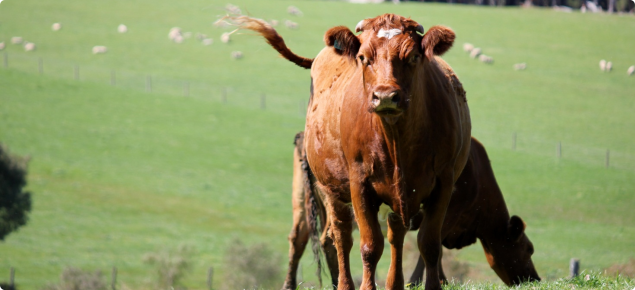Why is the ruminant feed ban important?
Australia’s ban on feeding animal material to ruminant animals helps prevent diseases such as bovine spongiform encephalopathy (BSE or mad cow disease) being transmitted to Australian livestock.
If the ruminant feed ban is not followed, Australia could lose its internationally recognised status as a country that has a “negligible risk” of BSE occurring. This would affect the Australian red meat industry’s access to premium export markets. The ruminant feed ban also helps protect the health of the Australian public because BSE can occasionally be transmitted to humans.
What do producers need to know about the feeding ban?
- Animal matter (known as ‘restricted animal material’ or RAM) must not be used in ruminant diets. Any matter that comes from a bird, mammal or fish is classed as restricted animal material (except for milk, gelatin and tallow, which are permitted for feeding to ruminants). Meatmeal, meat and bonemeal, bloodmeal, poultry offal, feathers and fishmeal are all restricted animal materials.
- Stockfeed must be labelled with a statement specifying whether or not it contains restricted animal material.
- Feed for ruminants must be stored so it does not come into contact with restricted animal material.
- Producers must not feed restricted animal material to ruminants and must not allow ruminant animals to access feed containing restricted animal material, such as pig feed and poultry feed.
- Producers should not allow ruminants to access any fertilisers that contain, or might contain, restricted animal material and should follow the guidelines below for using poultry litter or restricted animal materials on pasture.
The Department of Primary Industries and Regional Development (DPIRD) is responsible for enforcing the ruminant feed ban in WA. The requirements are prescribed in the Biosecurity and Agriculture Management (Agriculture Standards) Regulations 2013. Copies of the regulations are available from legislation.wa.gov.au.
Poultry and pig manure and some organic fertilisers are restricted animal materials
All of the following materials contain animal matter, so they are classed as restricted animal materials and must not be fed to ruminants:
- poultry and pig feed as they usually contain meatmeal or fishmeal
- poultry litter/manure and pig manure as:
- they usually contain spilt poultry and pig feed
- poultry manure may also contain feathers and dead birds
- composted poultry and pig manure is usually considered restricted animal material
- blood and bone fertiliser and similar products made from animal blood, meat waste and bone
- mushroom compost and similar products that are made from poultry litter
- food scraps or waste that may contain animal matter
- compost made from poultry litter, pig bedding, food scraps containing meat or dead animals or compost made with blood and bone.
Note: Producers should also prevent ruminants from accessing these materials when they are spread on a pasture or stored prior to using on pasture.
What do producers need to do to comply?
- Never feed ruminants with pig or poultry feed, pet food, or any other feed that contains restricted animal material.
- Never allow ruminants to access pig or poultry feed, pet food, or any other feed that contains restricted animal material.
- Never re-use poultry or pig feed bags for storing ruminant feeds.
- Make sure ruminants cannot access poultry or pig sheds, silos, discarded feed or manure.
- Fence off areas where restricted animal materials are stockpiled such composting or delivery areas.
- Producers who want to use restricted animal materials on pasture that ruminants graze should follow the guidelines below.
Guidelines for using poultry litter or other restricted animal materials on pasture
If a producer wants to spread manure, fertiliser or compost that may contain restricted animal material on pasture or paddocks that ruminants graze they should follow these guidelines:
- Incorporate the material into the soil or spread it thinly.
- Do not allow ruminants to graze treated pastures for at least three weeks. If the growing conditions are poor then stock will need to be excluded for longer until there has been significant regrowth to prevent stock ingesting any of the material.
- Be aware that the use of untreated poultry manure is prohibited in some areas of Western Australia as it is an attractive breeding material for stable fly. The current restrictions can be accessed from DPIRD’s Stable fly in Western Australia webpage.
- If you provide manure or litter directly to other properties, you should ensure they understand these requirements.

